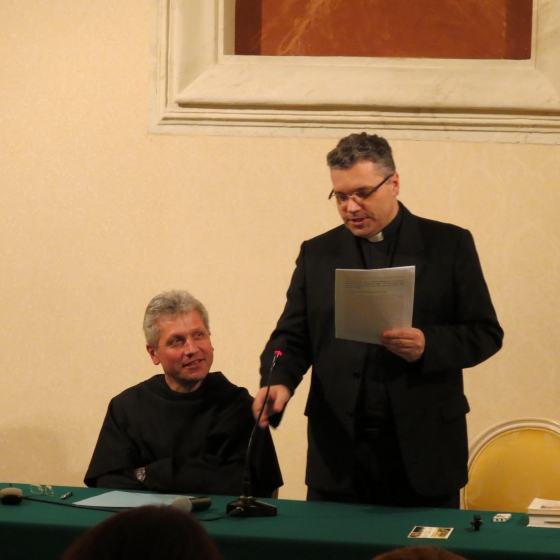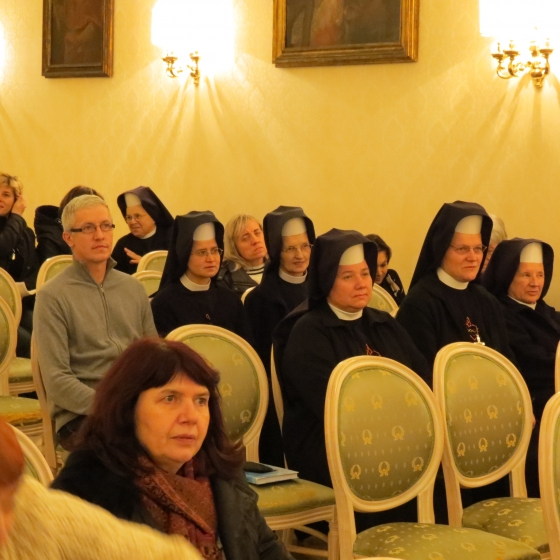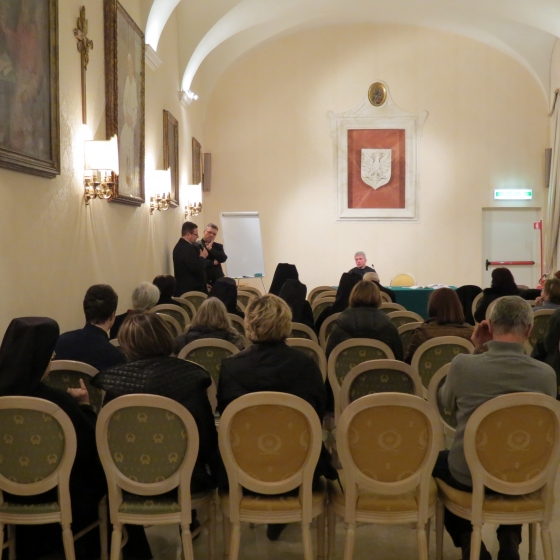On Sunday, February 2nd, 2014, the next meeting of the cycle ‘The Second Vatican Council as a Compass of the New Evangelization’, organized by John Paul II Pontificate’s Centre for Documentation and Research and the Pastoral ministry at the Polish church of Saint Stanislaus, took place in Rome. This time the meeting was centered around the interreligious dialogue and it was entitled ‘The Spirit of Assisi – Conversations about Religion’.
In the first part Rev. Dr. Andrzej Dobrzyński presented a historical sketch on the relationship of the Church to non-Christian religions. He stressed the fact that the issue had already been present in the beginnings of the Christianity. Dr. Dobrzyński reminded the teaching of the Church Fathers on ‘the Seeds of the Word’ included in pagan religions. He also referred to the appropriate understanding of St. Cyprian’s statement that there is no salvation outside the Church as to the words that first of all are indicating Jesus Christ as the only Redeemer and the salvific mission of the Church. Exploring the world and new geographical discoveries contributed to the further deepening of the issue connected with relations of the Church to the other religions. The process of formation of the human consciousness, concerning equal dignity of each man, regardless of his or her religion, and concerning following in every man’s life principles of respect and tolerance for others, lasted for hundreds of years. The speaker mentioned also connections between religion and politics that often had led to religious wars. In those times demons of intolerance and contempt for other religions woke up. They came to their climax in the 20th century ideologies of Nazism and Communism together with many persecutions and especially with the Holocaust of the Jewish nation carried by the Nazis.
If the Second Vatican Council was called to pave the ways of new evangelization, it would have to take the issue of religious pluralism. The issue lay deep in the heart of John XIII who ordered to prepare a project on relations of the Church to the Jews. Finally, it led to promulgation of the Declaration on the Relation of the Church to the Non-Christian Religions ‘Nostra Aetate’, in which a respect to this what is true in the great religions of the world was expressed. The document was also indicating a particular importance of Hinduism, Buddhism, Islam and Judaism. The Council stressed the connection between the Church and the People of Israel, resulting from the common history of salvation. It was confirmed that election of this People is still valid and attitudes of anti-Semitism and racism were condemned.
The common denominator of the conciliar statements about religions is emphasizing an anthropological aspect of religious phenomena. People may and should be together with an experience of searching for the truth and God, and also with spirituality. Religions express noble aspirations of human spirit. Therefore the dialogue between the Church and religions is not meant to create one religion for all but to lead people from different religions to mutual understanding helping to learn respect and community of life. The Church at the Council underlined that Christian faith is combined with love to all people. Everybody is called to salvation and therefore every Catholic is obliged to give witness of his or her faith but also to respect people of other religions. Thereby the Church paved an important way in her mission in the modern world, uniting the human family through the evangelization.
In the second part of the meeting Rev. Fr. Prof. Zdzisław Kjas OFM Conv. presented contribution of Bl. John Paul II to the interreligious dialogue. He added that its aim is mainly to act for the promotion of human dignity, peace among the nations, and cultural development.
Next, the speaker characterized the three main circles of development of this dialogue developed earlier by John Paul II. The first circle includes the Jewish people. A Pope’s visit in the synagogue in Rome on 25th May 1986 was of the groundbreaking and historical importance, as well as his description of the followers of Judaism as ‘elder brothers in the faith’. Professor also reminded the words of the Holy Father delivered in the Yad Vashem Institute on 23rd March 2000 and referred to his prayer at the Wailing Wall. Contempt for other man begins with the contempt for God – this important warning was taught by the Holy Father.
The second circle is created by the dialogue with Islam. The speaker reminded one of the Bl. John Paul II’s speeches exposed in Nigeria during a pilgrimage in 1982 in which he spoke about the things connecting Christians and Muslims. Three years later in Morocco, a memorable meeting took place, in which Muslim youth was listening to the Holy Father speaking about the past full of conflicts that had their origins in the wrong understanding of one another. The Pope also indicated a way leading to the better future: ‘We should respect each other and encourage one another to the good works’. The Pope noticed the things that were uniting people, e.g. an experience of prayer, and this way he taught mutual respect and responsibility for peace in the world.
The third circle includes the dialogue with the religions of Asia. For example, in the meetings with representatives of Buddhism John Paul II stressed an ethical dimension of this religion. He also emphasized that a provision of peaceful coexistence among the nations is impossible without the recognition of natural law.
Undoubtedly, a meeting in Assisi on 27th October 1986, with over 60 delegations present, had a crucial importance. Besides Christianity there were 13 representations of other religions. Professor underlined that in Assisi there was no a common prayer but different prayers of the representatives of each religion with only one intention – for peace. Mankind in all its diversity should reach to the vital sources, to spirituality in which morality is rooted. There were voices of objection concerning this meeting, the accusations for supporting the attitudes of relativism and irenism. Time has shown that it was a prophetic encounter, presenting a new way to peace, other than the one delimited by politicians, very often striving to use religion for their own purposes.
The meeting ended with discussion in which, among others, Rev. Paweł Ptasznik spoke, citing many memories form the travels of John Paul II that he could keep close track of. He underlined that the Holy Father knew how to respect what in other religions was true and good, and therefore he earned the recognition and respect from their believers.
